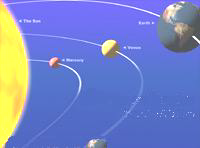The right timing for conception is extremely crucial
for the birth of a healthy pregnancy and a healthy baby. Even ancient peoples knew
methods of determining the best time for conception. Almost 2500 years
ago, Plato wrote about this in his “Republic,” and the Egyptian
pyramids have been found to contain special rooms for
conception. These
rooms contain a special opening in the ceiling through which one
can see an area of the night sky. The appearance of an
appropriate star in this opening would indicate the best moment
for the conception of an heir. In our time, more precise
determination of the optimal time for conception has become
possible with the help of analysis, based of the accomplishments
of the sciences, such as astronomy, physics, chemistry, medicine,
genetics, and mathematics.

The development and behavior of living organisms on
Earth is determined not only by the laws of medicine or biology
but also by other factors.
We are constantly under the influence of various
meteorological changes, the forces and distribution of
gravitational and electromagnetic fields, the position of the
Earth relative to other planets, as well as other phenomena still
unknown to science.
The key to understanding the many processes lies in the
utilization of all available areas of human knowledge.
When scientists research natural events, they almost
always factor in the effect of energy distribution. They consider such
occurrences as what kind of forces influence a ship at sea or an
airplane in the sky, a rocket rising to space and so on.
Scientists are constantly striving to find accurate mathematical
models to describe the object under study. After creating such
models it is possible to predict the behavior of the ship or the
plane in different situations with accuracy.
The energy exchange is well known and has been used
in engineering for a long time. In medicine and biology,
scientists use fewer energy criteria for analysis. It is easily
understandable since this is not their field, and they
subconsciously avoid using engineering methods for research. But
everybody agrees that energy distribution of forces and fields
have a significant affect on everything on Earth.
Let’s represent the earth as an energy system, which
is part of a bigger energy system – the solar system. The latter
is part of an even bigger system – the galaxy. The processes
inside these systems dramatically affect one another, including
earth. These external factors determine internal events on earth
and affect live organisms much more than people think. Clearly,
energy phenomena must be considered when medical and biological
issues are studied and described.
We incorporate these principles in our analysis of
the human reproductive system, and we have developed an energy
model that allows us to predict the state of the reproductive
process and how it affects the gender of a future baby. The
mathematical equations that describe energy distribution inside
the body turn out to be very similar to the equations describing
other well-known systems. This again confirms the known
philosophical principle of Similarity in Nature. For instance
Ohm’s law, in the field of electrical engineering, is very similar
to Hooke’s law in mechanics.
There many such examples between different scientific
fields.
Another example of similarity in Nature, more
related to humans, is the coincidence of woman’s menstrual and
lunar cycles. There are many different cycles in the human
reproductive system. Some of them are linked to certain
astronomical cycles, other are shorter and equal to biological
cycles. Everything is interdependent in Nature and the functioning
of our body is tightly correlated with the calendar, energy
distribution around us, planet positions and many other natural
factors. Taking into account as many factors as possible allows us
to obtain a high accuracy of analysis.
The most important task in family planning is
determining the optimal moment for conception. The Energy method
allows us to determine not only the time for ordinary ovulation,
but also for "spontaneous ovulation" caused by planets and other
factors. There turns out to be more opportunities for a woman to
conceive than most people think. Selecting the right moment of
conception can improve the chances of having a healthy baby and a
problem-free pregnancy. It is especially
important to know fertility days in cases of unexplained
infertility. In such cases, as well as with a poor sperm
count, analysis can dramatically increase the chances of
conception. According to research, in cases of unexplained
infertility, fertility optimization allows about 20% of couples to
conceive during the first year and about 33% during the first two
years reach the goal.
Our model has been well tested with real married
couples, as well as by retrospective analysis, in which we
calculated the gender of the children and then compared the
prediction with reality.
In retrospective analysis, the moment of conception is
calculated by working backwards the date of birth, and
consequently can be determined within two to three weeks, assuming
the conditions of a normal pregnancy. This retrospective
technique has an overall theoretical accuracy of about
89%. The Energy
Exchange method shows an accuracy of 88.5%. Collected practical
results provide an accuracy of 97.5% for a three week period of
conception. This number corresponds to one error in 40
cases.
The Energy Exchange method of modeling the human
reproductive system for extended periods of time provides the best
method for determining the optimum time to conceive, for baby
gender selection and for contraception. It is absolutely safe
because it neither uses medicine nor a physical influence on the
body. Analysis provides the best time to conceive a healthy baby
of desired gender. In addition, there is a far greater chance of
having a healthy pregnancy, free from
complications.








